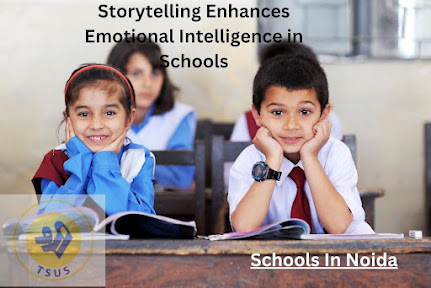Ways Storytelling Enhances Emotional Intelligence in Children
Understanding Emotional Intelligence
Before delving into the impact of storytelling, it's crucial to grasp the essence of emotional intelligence. EI encompasses the ability to recognize, understand, and manage emotions, both in oneself and in others. It involves skills such as empathy, self-awareness, self-regulation, and social competence, which are vital for navigating life's challenges effectively.
Cultural Understanding: Embracing Diversity
In a multicultural best school greater in Noida, fostering cultural understanding and appreciation is paramount. Storytelling exposes children to diverse cultural traditions, beliefs, and practices, promoting inclusivity and empathy towards individuals from different backgrounds. Through stories, children learn to celebrate diversity and cultivate a global perspective.
Empathy: Building Bridges through Narrative
Storytelling serves as a bridge connecting children with diverse characters, cultures, and experiences. Through exposure to different perspectives and emotions portrayed in stories, children develop empathy—the ability to understand and share the feelings of others. As they empathize with characters facing various challenges, children learn to appreciate different viewpoints and relate to others' emotions.
Emotional Identification: Recognizing Feelings
Engaging narratives help children identify and label emotions, thereby increasing their emotional vocabulary. As they follow characters through ups and downs, joys and sorrows, children learn to recognize and articulate their own feelings. This heightened emotional awareness lays the foundation for effective self-expression and communication.
Self-Reflection: Learning from Characters' Journeys
Stories provide a safe space for children to reflect on their own experiences and choices indirectly. By observing characters navigate dilemmas and overcome obstacles, children introspect and gain insights into their own thoughts and behaviors. This process of self-reflection fosters self-awareness, a fundamental component of emotional intelligence.
Regulation Techniques: Strategies from Storytelling
Effective storytelling often involves characters managing their emotions and making decisions under pressure. Through such narratives, children learn valuable strategies for regulating their own emotions. Whether it's taking deep breaths like a character facing a challenge or using positive self-talk like a protagonist overcoming self-doubt, storytelling offers practical tools for emotional self-regulation.
Social Skills: Navigating Interpersonal Dynamics
Stories abound with examples of interpersonal interactions, friendships, conflicts, and resolutions. By immersing themselves in these narratives, children learn valuable lessons in social competence. They observe how characters communicate, negotiate, and resolve conflicts, gaining insights into effective interpersonal skills crucial for building healthy relationships.
Coping Mechanisms: Resilience through Narrative
Life is full of uncertainties and setbacks, and storytelling equips children with the resilience to bounce back from adversity. Through stories of resilience, perseverance, and hope, children learn that setbacks are temporary and that they possess the strength to overcome challenges. This resilience mindset nurtured through storytelling is essential for navigating life's inevitable ups and downs.
Moral Development: Ethical Insights from Narratives
Many stories convey moral messages and ethical dilemmas, prompting children to contemplate right and wrong. By grappling with moral quandaries presented in stories, children develop a moral compass and ethical reasoning skills. They learn to consider the consequences of their actions and make principled decisions—an integral aspect of emotional intelligence.
Imagination and Creativity: Emotional Expression through Art
Storytelling unleashes children's creativity and imagination, allowing them to express and explore complex emotions in a safe and imaginative space. Whether through drawing, writing, or role-playing, children engage with stories in multifaceted ways, enhancing their emotional expression and creativity.
Parent-Child Bonding: Shared Stories, Shared Emotions
In the bustling city of Noida, where parents juggle demanding schedules, storytelling offers a precious opportunity for quality bonding with their children. Through shared stories, parents and children connect on an emotional level, fostering trust, intimacy, and mutual understanding. These shared experiences strengthen the parent-child relationship, laying the groundwork for emotional resilience and support.
Conclusion
In the quest for providing children with the best education, Best schools in Greater Noida recognize the significance of emotional intelligence alongside academic achievement. Storytelling emerges as a potent tool for nurturing emotional intelligence, fostering empathy, self-awareness, social skills, resilience, and more. By integrating storytelling into educational curricula and family routines, we can empower the next generation of Noida's children to thrive emotionally, academically, and socially.

Comments
Post a Comment